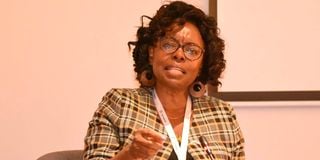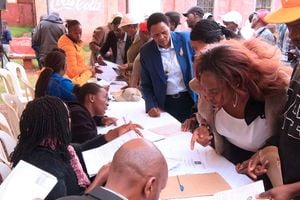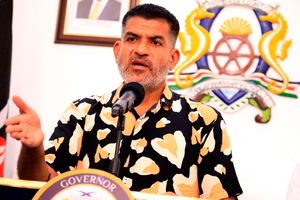
Controller of Budget Margaret Nyakango.
The battle over the multibillion-shilling student bursary schemes and the backbone of the education of millions of poor learners has taken a new twist after the Controller of Budget stopped governors from awarding bursaries to students in primary, secondary and tertiary levels of education.
The move by Controller of Budget Dr Margaret Nyakang’o has sparked fury among governors and the Orange Democratic Movement (ODM), just months after MPs debated a proposal to consolidate all bursary schemes under the Ministry of Education, but with them having a big say.
MPs want bursaries under the National Government Constituencies Development Fund (NG-CDF), National Government Affirmative Action Fund, and other county and ward-based schemes put into one fund managed by the Ministry of Education, but which they later said could be placed under their watch in what could lead to a further clash with other political leaders.
In the counties, governors usually set aside millions of shillings in bursaries, an expenditure that Dr Margaret Nyakang’o now says is irregular as only Early Childhood Development Education (ECDEs) is devolved.
“Part 1 of the Fourth Schedule under Section 16 designates universities, tertiary educational institutions, primary schools, special education, secondary schools and special education institutions as functions of the national government,” said the Controller of Budget in a letter to all county executive committee members for finance dated January 14.
She said the Constitution only assigns pre-primary education, village polytechnics, home craft centres and childcare facilities to county governments.
“For a county government to offer educational support towards functions classified under Part I of the Fourth Schedule, there is a need to transfer the function in accordance with Article 187 of the Constitution.”
Dr Nyakang’o said the process requires the formulation of an intergovernmental agreement that must be executed by an authorised person and published in the Kenya Gazette.
“Any requisition for withdrawal of funds to perform functions categorised as national government functions under Part I of the Fourth Schedule must be accompanied by the requisite intergovernmental agreement as prescribed by the law,” said Dr Nyakang’o in the letter.
Big-money schemes
This means that governors who budgeted millions for bursaries will be forced to re-channel the money to other budget lines, or seek to have the national government transfer the function of post-ECDE education to them.
Bursaries are big-money schemes, and are often used by politicians for their selfish gains.
According to the Constituency Development Act, MPs are allowed to allocate up to a maximum of 40 per cent to bursaries.
In the 2024/25 financial year, NG-CDF has a total allocation of Sh68.23 billion, with every constituency expected to allocate not less than 40 per cent of their respective budgets to bursaries.
The NG-CDF board says on its website that bursaries benefit 1.2 million needy students annually. It also says it has built 3,087 new schools — 1,369 primary and 1,718 secondary.
The Higher Education Loans Board (Helb) has been allocated Sh31.18 billion this financial year.
On its website, Helb says it has disbursed funds to 1.23 million university and, recently, college students in the last 27 years, totaling over Sh130 billion in that period.
Counties do not allocate a uniform figure of bursaries, but assuming it is an average of Sh50 million per county annually, that would amount to Sh2.3 billion. And the 47 Woman Representatives also receive around Sh1 billion for bursaries.
All the 290 constituencies are each also allocated Sh1.35 million for bursaries under the Presidential Bursary. The bursary is administered at the constituency level, through a committee known as the Presidential Bursary Sub-Committee. This is a sub-committee of the Constituency Social Assistance Committee. It receives, vets and approves applicants.
The Council of Governors yesterday rejected the order by Dr Nyakang’o, arguing that bursaries cannot be assigned as a function of any level of government. The council said bursaries are social support programmes expected of both levels of government, and that they are validly budgeted, and approved by the controller, based on existing laws passed by the county assemblies.
The Council of Governors Chairperson Ahmed Abdullahi said that the Controller of Budget had erred because bursaries were not attached to any function — devolved or not.
“Bursary is not a function assigned to any level of government. It is about social protection like supporting children’s affairs, curbing poverty and upholding vulnerable children’s right to education. This is politics. The Controller of Budget’s office should not be used to propagate politics,” Mr Abdullahi, who is also the Wajir governor, told NTV.
“The same principle should be used to tell the national government to stop the construction of markets, housing programmes, fertiliser distribution and 80 per cent of health functions.”
The Council of Governor’s Education Committee Chairperson Erick Mutai said Dr Nyakang’o’s letter was erroneous.
“There is no county government or national government child. Bursaries are social support and no child should be disenfranchised because of this,” Dr Mutai said. “To say that counties should not give these bursaries is suicidal to thousands of children. It is unfair.”
Nyeri Governor Mutahi Kahiga said: “Bursaries are social support programmes, they are not assigned to any level of government. They are created by necessity because the people have challenges.”
Every county, Mr Kahiga said, had bursaries in their budgets, backed by laws in the regions, and had all been approved by the controller.
“What is this new thing that has happened that the Controller of Budget now wants to tell us that counties cannot award bursaries already in budgets that her office approved?” Asked the governor.
At the same time, ODM interim leader Prof Anyang’ Nyong’o, his two deputies Abdullswamad Nassir and Simba Arati, as well as the party’s national chairperson Gladys Wanga said the decision highlights a troubling pattern of political double standards.
“While county governments are being targeted with embargoes, the national government continues to act with impunity, and encroaching on devolved functions without consequence. This includes the unilateral payment of Community Health Promoters, the imposition of the Housing Levy — despite housing being a devolved function — and the construction of markets without signed intergovernmental agreements,” said the county bosses.
In their statement Prof Nyong’o (Kisumu governor), Ms Wanga (Homa Bay), Mr Arati (Kisii), and Mr Nassir (Mombasa) said county governments have implemented transformative programmes to increase access to education, such as bursary schemes, school feeding programmes, and infrastructure support.
“These programmes are now at risk of collapsing,” they added.
They cited Kisumu, Mombasa, Kisii, and Homa Bay counties where thousands of children rely on county-supported bursary programmes and school initiatives to remain in school.
“The impact of this directive will be felt most acutely in critical areas such as education, particularly in historically underserved and marginalised regions,” the governors said.
Equitable measures
The leaders urged the Controller of Budget to reconsider the directive and to apply equitable measures that uphold the constitutional rights and responsibilities of both levels of government.
“Devolution was designed to empower counties, foster equity, and bring services closer to the people. Unilateral actions that undermine counties risk stalling progress and deepening inequalities,” the governors said in a joint statement.
The letter by Dr Nyakang’o, if actualised, would be welcome news to MPs who late last year started a process to consolidate all bursary budgets under their control.
Both Changamwe MP Omar Mwinyi and Nairobi Woman Representative Esther Passaris have filed separate proposals in Parliament for the consolidation of all government funds that finance bursaries so that there can be free education in the country.
Meanwhile, the Ministry of Education has drafted a Bill to consolidate bursaries and scholarships into one fund.
National Assembly Speaker Moses Wetang’ula in September last year backed Mr Mwinyi’s proposal.
“If you can generate a policy to amalgamate these funds, this House will be more than willing to turn it into a law so that we get a university education that is free,” said Speaker Wetang’ula when the matter came up in September 2024. Our problems will be solved overnight.”










